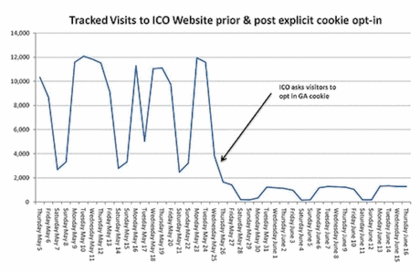Cookie legislation sees few losses
Cookie legislation hurts opt-in websites but most sites are unaffected

New data from tag management business QuBit shows nearly three in five internet users are refusing to accept cookies if asked to opt in when visiting a website. However 99.9% give consent if they are simply notified that a site uses cookies.
The data was compiled using QuBit's Cookie Consent tool from more than 500,000 user interactions since the EU e-Privacy Directive aka "the cookie law" came into force on 26 May 2011.
The data looked at three different consent processes;
- Notification only - The website informs users that Cookies are running.
- Implicit consent - The website informs users that Cookies are running but offers the option to disable them.
- Explicit Consent - The website asks users whether they would like to enable Cookies.
Explicit consent resulted in a 57.2% consent rate, implicit consent generates a 99.7% acceptance rate and notification resulted in a 99.9% consent rate.
The results show that much of the fears amongst site owners that the Cookie Law could have a damaging and widespread impact on their business were groundless, however it remains to be seen if the Information Commisioner's Office (ICO) will find the light-touch implicit consent and notification used by the majority of web sites is enough.
"If compliance procedures are properly implemented, then businesses can rest assured that cookie-based technologies will still be applicable for the vast majority of their user base." Graham Cooke, CEO of QuBit
The move from the ICO to allow a more light-touch came in a last minute edict the day before the law was due to go into practice. Previously the ICO had been more stringent in the interpretation of the directive, which caused the government to give businesses an extra year to get the law implemented. The ICO themselves used the explicit consent strategy, and saw a significant drop-off of traffic last year (see graph below) prompting businesses to fear a huge loss in traffic and sales.
Are you a pro? Subscribe to our newsletter
Sign up to the TechRadar Pro newsletter to get all the top news, opinion, features and guidance your business needs to succeed!

Graham Cooke, CEO of QuBit, said: "Prior to the introduction of the law it was unclear the extent to which the EU Privacy Directive was going to impact on web businesses. However, this data seems to indicate that, if compliance procedures are properly implemented, then businesses can rest assured that cookie-based technologies will still be applicable for the vast majority of their user base.
"The gap between consent rates for implicit and explicit consent indicates that the ICO's guidance towards implicit solutions was the right way to go. This approach still gives consumers clear and informed choice but doesn't impact negatively on the digital ecosystem.
What do you think? Was your business effected by the legislation? We'd like to hear your thoughts.